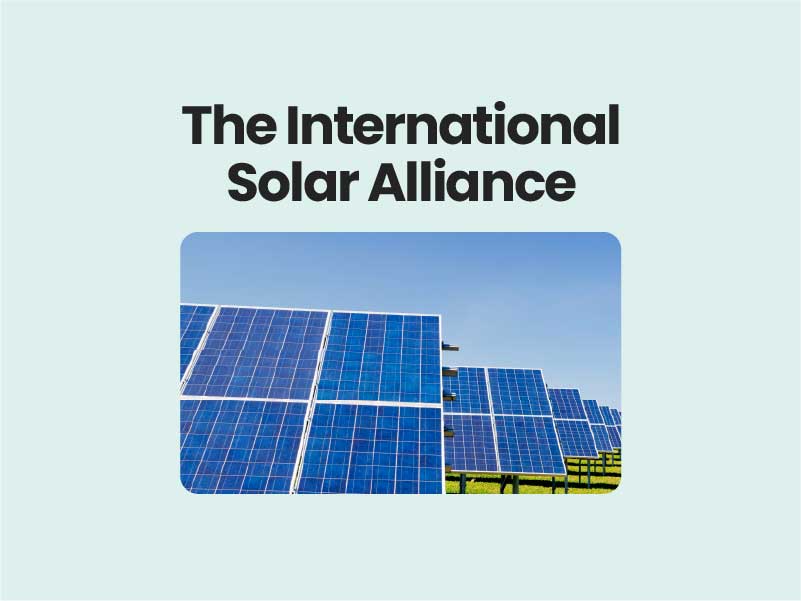Companion@360 → 7 Month programme to sharpen your writing skills → REGISTER NOW

International Solar Alliance (ISA)
The International Solar Alliance (ISA) is a joint initiative of France and India, launched during COP21 with the aim of making an unprecedented effort to promote solar energy. The goal of the ISA is to set the ground rules, norms and standards for solar energy, in order to obtain a rapid and massive deployment in countries that are rich in solar resources but where the risks are still seen as high.
- The ISA is putting in place concrete tools, capacity-building measures and innovative financial instruments.
- One example is the harmonization of public policies, regulations and prices between the countries, which reduces the uncertainties, strengthens the economic viability of solar projects and reassures the investors.
Alliance’s aims:
The Alliance seeks to bring about a major decrease in the cost of solar energy so that its deployment can be scaled up in the solar-rich countries located between the two tropics.
It therefore has several goals:
- To bring about a major decrease in the cost of solar energy
- To meet the high energy demand in developing countries
- To contribute to the fight against climate change
How can these aims be achieved?
- Establish a political, regulatory and contractual environment that encourages investment in solar energy.
- Mobilize funding on an international scale.
- Consolidate the programmes offered by the training, research and innovation network.
India’s Role:
- The Government of India has allotted 5 acres of land to the ISA in National Institute of Solar Energy (NISE) campus, Gurugram and has released a sum of Rs. 160 crore, i.e. US$ 26 million for creating a corpus fund, building infrastructure and meeting day to day recurring expenditure of the ISA up to the year 2012-22.
- As per commitment, India will release additional Rs. 15 crore, i.e. US$ 2.1 million in the year 2020-21. In addition, various Public Sector Enterprises of Government of India have contributed US$ 8 million for augmenting ISA corpus fund.
- Apart from these, India has set aside US$ 2 Billion for solar projects in Africa out of Government of India’s US$10 Billion concessional Line of Credit (LOC) for Africa.
- Exim Bank of India is implementing this line of credit in close coordination with ISA countries in Africa.
- On the 24th September 2019, on the side-lines of the 74th UN General Assembly, India announced allocation of US$ 12 million grant, and a concessional LOC of US$ 150 Million for Pacific Islands Developing States for undertaking solar, renewable energy and climate related projects.
France’s role:
- France uses its diplomatic network to bring the ISA’s priorities to the One Planet Summit, to all of the relevant multilateral bodies (the United Nations Secretary-General’s Climate Summit, COP25, the International Renewable Energy Agency (IRENA), the Africa Renewable Energy Initiative (AREI), the International Energy Agency (IAE), etc.) and to the multilateral development banks.
- France also mobilizes the private sector.
- The Syndicat des Énergies Renouvelables (SER) and MEDEF International, along with their Indian counterparts, co-chair an international committee of chambers of commerce that makes recommendations to the ISA on the conditions that encourage private investment in solar energy.
Solar is a key source of affordable and reliable energy, thus it could play a significant role in achieving the universal energy access goal (SDG 7).Best
Best Books for UPSC Preparation Check Now

